#jewish story premise
Explore tagged Tumblr posts
Text
Do you know this Jewish character?
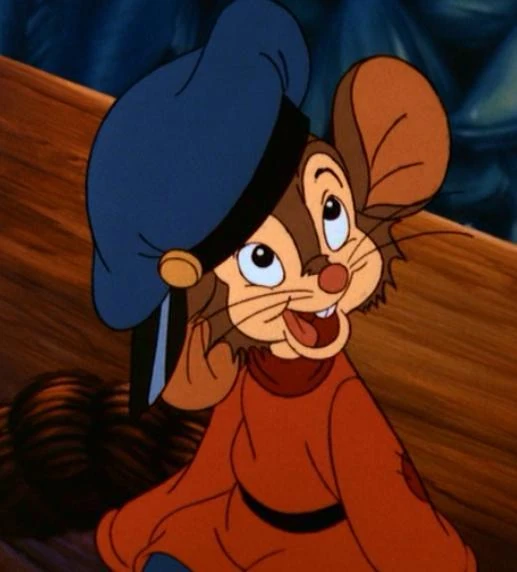
86 notes
·
View notes
Text
tryinnng to finish the first chapter of James Flint Becomes Jewish just in time for pesach, I promise I have not forgotten all the jewish black sails girlies out there 💖 you're in for a treat
#so the premise is#flint becomes obsessed with the history of the jewish pirates successfully capturing the spanish treasure fleet#he determines that judaism must be the key to their success#he gets the crew to start observing jewish holidays and SILVER IS JEWISH but literally still hiding every aspect of his life story#and flint is just very much the guy who's ''a little confused but he's got the spirit'' while silver is struggling like#all right how much can i correct him on without revealing that I'm jewish#eventually flint does hire a rabbi but you'll have to tune in to hear more 🌈🌈🌈
3 notes
·
View notes
Text
you know what really grinds my gears?
okay, bear with me: so as you may know, harry houdini and arthur conan doyle were friends, at least for a while.
by the early 1920s, both arthur conan doyle and acd's wife jean, aka lady doyle, believed whole-heartedly in spiritualism, talking to ghosts and all of that. (sidenote: this was of course right on the heels of a devastating world war and a devastating pandemic, both of which had created a huge population of grieving people, so spiritualism was having a moment.)
lady doyle sincerely thought she had the ability to go into a trance state and pass along messages in writing from the dead. she offered to do this for houdini. houdini agreed.
lady doyle attempted to channel houdini's late mother. she basically drew a cross at the top of the paper and filled it with generic platitudes addressed to "harry." houdini's mom was jewish and didn't talk like that, so houdini knew the jig was up, even if lady doyle didn't. but not wanting to make the situation awkward, he kind of went along with it to their faces.
then acd decided to publish a glowing account of the seance, and since both he and houdini were super famous, it got a lot of attention, and letters started pouring in for houdini, asking if this was true. ultimately, houdini couldn't lie about it. so he essentially said, like, "yeah, i think lady doyle THINKS she can talk to ghosts but she absolutely can't." and it ruined his friendship with acd forever.
and then of course a lot of the people running seances weren't even well-intentioned like lady doyle, they were just simple charlatans taking advantage of traumatized people mourning loved ones. in houdini's youth, he and his wife had traveled the carnival circuit where he did an act pretending to commune with spirits, so he knew all the tricks of the trade AND he had lingering guilt over having done this, AND he was infuriated by this increasingly popular wave of con artists so he decided to assemble a team of anti-grifting grifters and together they went on the road exposing whichever spiritualists were preying on the locals.
houdini's best agent was a young woman named rose mackenberg, who donned disguises to visit the fraud de jour and then importantly sussed out what non-supernatural thing was actually happening, and then houdini would demonstrate the techniques onstage to packed audiences.
(if you want to know more, check out episode 175, "ghost racket crusade" of the podcast Criminal or read Tony Wolf's book The Real-Life Ghostbusting Adventures of Rose Mackenberg.)
but yeah, what really gets my goat is that all this happened and as far as i know, we still don't have like four seasons of a Leverage-style historical procedural about rose mackenberg and the rest of the crew having adventures in the 1920s as they unmask craven hucksters all over the united states. (what we do have, apparently, is one season of a show called "houdini and doyle" which is about the oddball friendship of two contrasting men solving sometimes-actually-supernatural mysteries, and whose premise does i think at the very least a real disservice to houdini's whole quest and also totally erases rose, who is arguably the most interesting part of this story to me.)
i am just steamed about this. steamed.
11K notes
·
View notes
Text
This post is for the anon who sent me that video asking me to debunk it's claims so they can be better equipped against accusations of antisemitism.
Sorry, I won't post the video since I refuse to have that man on my blog but I can give you common Zionist talking points and the illogicality behind it.
To preface: most of the questions Zionists will ask you are a trap, and will make you fall into a "rabbit hole" (as I was once told when I was younger), as we try to apply their reasoning. My advice is to ALWAYS center the humanity of Palestinians. For example, when a Zionist says:
"Don't Jews deserve a homeland to be safe?"
It fundamentally ignores the core issue: Palestinians are being raped, murdered, and expelled from their homes so that the establishment of this so called "homeland" may exist. When people ask this to you, I personally advise saying something like:
Why must Palestinians suffer for the establishment of this homeland?
Always recenter to the issue at hand—the inhumane removal and treatment of Palestinians.
"Palestine belongs to the Jews and Not Muslims"
The whole premise of this claim is flawed—there is a weird tendency to equate Arab/Palestinian=Muslim when it just is like. Completely untrue. There are Palestinian Christians, Bethlehem is famously a Christian city, who have been there for centuries. There are Palestinian Jews, who have been there for centuries. There are Palestinian Muslims, who have been there for centuries. My grandpa told me stories of how he would turn on lamps for his Jewish neighbors in Al-Khalil (or Hebron) during Shabbat.
To claim that Palestine is EITHER Islamic or Jewish doesn't make any sense and completely neglects the fact that dissemination of culture has occurred for centuries, as well as the intermingling of people throughout generations. To somehow assert that for some reason, Jews and Muslims did not have ANYTHING to do with each other—did not create together, did not build families together, did not build culture together, all while being PALESTINIAN—is incredibly racist and nonsensical. "Palestinian" is not a religious identity—it's a cultural and ethnic one.
Also, it does not negate the core issue—Palestinians are being killed, removed, and tortured so that others can live on that land.
"Well what about [something about partitioning land]?"
Honestly like, who cares about the partitioning throughout the 1900 and early 2000s. Sorry, I'm not going to list the whole "partitioning" history nonsense. The whole reason "Israel" exists is because of a Mass Exodus, murder, and rape of Palestinians. Everything after that is rendered obsolete.
"Well, I heard Palestinians allied with Hitler"
I don't know how to tell you this but Palestine was under British Control. No they didn't.
"Israel withdrew from the Gaza and left them to themselves and they put Hammas in charge"
Oh yeah, Israel totally left Gaza, that's why Gazans' water, electricity, internet, and food is completely controlled by Israel (this is sarcasm, Israel still controls basic life in Gaza).
Go back to centering the idea that no human deserves to be shoved into an open-air prison, starved, and controlled. Did you know that the Zionist Entity controls the amount of water Gazans receive, as well as counting their calories to ensure they don't have enough energy on a day to day basis?
"I heard Israel asked Arabs to stay"
Show them these papers and videos when they say this:
youtube
If you can't show them these videos, check in the next point what to say.
"Well the Palestinians left of their own will in 1948"
Palestinians in 1948 didn't "leave." They had heard of how the Zionist Entity was slaughtering Palestinians en masse. Women especially heard stories of rape and sexual violence. They fled from *violence*. Again, from an earlier post, that this was a calculated effort on the Zionist Entity's part to try and get them to "leave" on their own and "abandon" their houses so that they can come in and say "hey, they left on their own so, we can come in and take their houses now."
Anyways, the idea that once you leave your house you can't ever come back to it is incredibly odd to me as an argument on Zionists' part. Like if you leave your house right now to go to the grocery store and you come back and see someone in your house and they're like "sorry dude, this is my house now, you left so that means you can't come back," you'd be like, "what the hell!" It would be even weirder if everyone agreed with the guy who took your house, which is what happened to Palestinians.
In Al-Khalil, or Hebron, Palestinians always have to have someone stay in their house or else a Settler will come in and take it from them. So it still goes on today as well.
This is not a point, but when that one person in the video said "Arabs lived under Israeli rule" and showed a clip of a bustling city with mountains, I'm pretty sure that was Amman, Jordan, not Palestine lol. Those buildings in the mountains look like how downtown Amman builds the residential areas. Could be wrong tho.
"There are no Jews living under Palestinian rule in Palestine"
What is this, some sort of gotcha argument? What are they trying to prove, the racist (obviously false) notion that Palestinians hate Jews as a whole? How do they know no Palestinian Jew lives in Gaza? Also, Settlers in Palestinian Territory exist??? I had never heard this claim before, its incredibly stupid lol. You're automatically a citizen of "Israel" if you're Jewish, whether or not you live in or outside of Palestinian Territories. So of course technically they don't live under Palestinian rule, they're granted full rights as an "Israeli" citizen automatically!
Go back to talking about the inhumane treatment of Palestinians, I wouldn't bring up the above counterpoint unless they really won't let it go since the main point is mistreatment.
"Why are Christians supporting Israel then, if it's a secular issue rather than a religious one?"
Well actually for a couple reasons:
Oil interests and regional control of goods (White People Supporting White People).
Weird fundamentalist ideology where they want to enact the second coming of Christ.
And finally because they are racist and don't think Arab Christians deserve to live. They literally bombed a 1500+ year church the other day. Why would (White) Christians cosign that.
Anyways, its a stupid argument again, because it forgets the core issue of Palestinians dying and being displaced.
In summary, always go back to the point of centering the Palestinians being displaced, tortured, and murdered, no matter the argument a Zionist gives you.
#palestine#gaza#info post#maybe i should do a masterpost with links to palestine education#maybe later#Youtube
6K notes
·
View notes
Text
Been thinking about why the argument that OFMD is inherently a bad show because it's based on historical slaveowners so often feels disingenuous to me as a person of color.
HUGE disclaimer up front: if you don't wanna fuck with the show because of that premise right out the gate, that's 100% valid and I completely get that. I'm not talking about that. What I'm specifically talking about is White fandom people in particular who argue that OFMD must be "problematic" because of this, especially when they say this as some kind of virtue-signalling trying to win points in fandom wars, stuff like that.
My big thing is that the resemblance the characters in OFMD have to their real-world namesakes begins and ends with having the same name. The show feels more to me like it's playing with the vague myths around these names, not the people themselves. Can you make an argument that they should have come up with original characters instead? Sure, but let's be honest, even people who study the irl counterparts have very little knowledge of their actual lives, and the average person has all but none. To add to that, this show has absolutely zero interest in historical accuracy; the moment they cast a Jewish-Polynesian man as Blackbeard that became obvious. No one is saying the real-life Blackbeard and Stede Bonnet were good people, least of all the show itself; the point is that OFMD's versions are basically original characters already.
It always feels like an incredibly disingenuous claim to parallel the show to Hamilton, because Hamilton both did care about historical accuracy and also brought up the slave trade. Hamilton is uncomfortable for so many poc because it writes poc into the story of otherwise very faithfully portrayed racists, colonizers, and slaveowners and just handwaves the racism. In OFMD, racism exists, but the stance is always explicitly anti-racist and anti-colonialist in a way that is just so fun to see (whom among us has not wished to skin a racist with a snail fork?).
The other thing that sticks for me is...there's an appropriate amount of slavery I want to see in my romcoms, and that amount is none. I am so sick of historical fiction where Black characters are only there for trauma porn about the horrors of the slave trade. You can make a legitimate argument that OFMD is handwavey about the slave trade, but I'd argue that including discussion of the slave trade is something that should be done with such incredible care that it would leave us with a show that can't really be a comedy at all anymore. OFMD's characters of color are allowed to be nuanced, complex characters with their own emotions, and it's incredibly refreshing to see, and I'd much rather have that than yet another historical fiction show where the only characters of color are only there to make White audiences feel virtuous about how sad they feel for them.
In conclusion, I guess: every yt person who makes this argument to win points in a fandom war owes me and every other fan of color a million dollars
3K notes
·
View notes
Text
How can non-Jewish writers include Jewish characters in supernatural stories without erasing their religion in the process?
Anonymous asked:
I have a short story planned revolving around the supernatural with a Jewish character named Danielle (who uses they/them pronouns). Danielle will be one of a trio who will be solving the mystery of two brides' deaths on the day of their wedding. My concern with this is the possibility of accidentally invalidating Danielle's religion by focusing on a secular view of the afterlife. At the same time, I don't want to assume that Jewish people can't exist in paranormal stories, nor do I want to use cultural elements that don't belong to me. So, how do I make sure that Danielle is included in the plot without erasing their Jewishness?
Okay so to start with I think we need to ask a question about the premise: what is a secular afterlife? I’m not asking this to nitpick or be petty, but to offer you expanded ways of thinking through this issue and maybe others as well.
A Secular Afterlife
What is a secular afterlife? To begin with, I get what you mean. The idea of an afterlife we see in pop culture entities like ghost media owes more to a mixture of 19th-century spiritualist tropes drawn from titillating gothic novels than to anything preached from the pulpit of an organized house of worship. Yet those tropes--the ominous knocking noises from beyond, the spectral presences on daguerrotype prints, the sudden chill and the eerie glow, all of those rely on the idea of there being something beyond this life, some continuation of the spirit when the body has ceased to breathe. For that, you need to discount the ideas that the consciousness has moved on to another physical body and is currently living elsewhere, and that it was never separate from the body and has now ceased to exist. Can we say that this is secular?
More so: Gothic literature, as the name suggests, draws heavily on Catholic imagery, even when it avoids explicit references to Catholicism. Aside from the architectural imagery, Catholic religious symbols permeate the genre, as well as the larger horror and supernatural media genres that grew from it: Dracula flinches from a crucifix, priests expel demons from human bodies, Marley’s Ghost haunts Ebenezer Scrooge in chains. The concepts of heaven and hell, and nonhuman beings who dwell in those places, are critical to making the narratives work.
The basis also draws from a biblical story, that of the Witch of Endor. The main tropes of Victorian spiritualism are present: Saul never sees the ghost of Samuel, only the Witch of Endor is able to see “A divine being rising” from wherever he rises from, and her vague description, “I see an old man rising, wearing a robe,” evokes the cold readings of charlatan mediums into the present (Indeed, some rabbinic sources commenting on this assert that this is exactly what was going on).
While neither of these views of its origin define the genre as the sole property of Catholicism--or of Judaism for that matter--it would be hard exactly to categorize them as secular.
A Jewish Perspective on ghosts
However, it’s not the case that ghost media is incompatible with Jewishness, assuming that it doesn’t commit to a view of heaven and hell duality that specifically embraces a Christian spiritual framework.
Jewish theology is noncommittal on the subject of the afterlife. The idea of a division between body and soul in the first place is found in ancient Egypt, for instance, earlier than the earliest Jewish texts. In Jewish text it’s present in narratives like the creation story, in which God crafts a human body out of earth and then breathes life into it once it’s complete. It also appears in our liturgy: the blessings prescribed to be recited at the beginning of the day juxtapose Elohai Neshama, a blessing for the soul, with Asher Yatzar, expressing gratitude for the body, recited by many after successfully using the bathroom.
Yet it’s not clear that this life-force is something separate than the body that lives beyond it, until the apparition of the Witch of Endor. The words we use to describe it, whatever it is, evoke the process of breathing rather than that of eternal life: either ruach (spirit, or wind) or neshama (soul, or breath): neither is a commitment to the idea that it does--or that it doesn’t--go somewhere else when the body returns to the earth.
Jewish folklore, however, leans into the idea of ghosts and other spiritual beings inhabiting the earthly plane (and others). Perhaps most famous is the 1937 movie The Dybbuk, in which a young scholar engaging in kabbalistic practices calls upon dark forces to unite him and his fated love, only to find himself possessing her body as a dybbuk. It appears that he is about to be successfully exorcized, but ultimately when his soul leaves her body, hers does as well.
More relevantly to your story, a Jewish folktale inspired the movie The Corpse Bride. In the folktale version, a newly-engaged man jokingly recites the legal formula he will soon recite at his wedding, and places his ring on the finger of a nearby corpse--a reference to a time when antisemitic violence is said to have gotten worse not only at Jewish and Christian holidays as it does still to this day, but around Jewish weddings as well. The murdered bride stands up, a corpse reanimated complete with consciousness, and demands that the bridegroom honor his legal obligation.
In the movie, the bride gives up her demand willingly: her claim on him is emotional rather than legal, and she finally accepts that he has an emotional connection with another person, that he doesn’t love her. In the folk tale, the dead woman takes him to court to decide whether their marriage is legal, since he spoke the legal words to her in front of witnesses as is required, and the court rules that the dead do not have the right to make legal demands on the living. In this version, the moral of the story is that a legal formula is an obligation; that when he jokingly bound himself to the corpse, he not only disrespected the dead but also the legal framework that structures society, and by so doing risked being obligated to keep his side of a contract he never intended to enact.
This speaks to the ways that a Jewish outlook can differ from a Christian-influenced “secular” one. Christian-influenced cultural ideas can often focus around feeling the right thing, while Jewish stories will often center on doing the right thing. Does the Corpse Bride leave because she realizes she is not the one he loves? Because she--or he--learned a valuable lesson? Or because she loses her court case? It’s not that the boy’s emotions are irrelevant to the story--the tension, the suspense, the horror of the story takes place primarily within the boy’s emotional landscape--but emotions on their own are not a solution. The question “should he marry her” can be answered emotionally, but “has he married her” can only be answered by a legal expert, and once it has been the deceased bride may not have changed her emotional attachment to him, but she no longer has legal standing to pursue her claim.
Centering legal rectitude over emotional catharsis isn’t a requirement for having Jewish characters in your story, but it’s worth thinking about what is and isn’t universal, what is and isn’t actually all that secular.
Meanwhile, back at the topic:
Where does any of this place Danielle?
Well, unless you’re positing a universe in which Christian or other deities or cosmologies are confirmed to exist (See Jewish characters in a universe with author-created fictional pantheons for more on that topic), there’s no reason why they shouldn’t be perfectly fine interacting with whatever the setting you’re building throws at them.
My wishlist for this character and setting runs more to the general things to consider when writing fantasy settings with Jewish characters:
Don’t confirm or imply that Jesus is a divine being. That means no supernatural items like splinters of the cross, grails, nails, veils, etc. There’s nothing particularly powerful or empowering about this one guy who lived and died like so many others.
Don’t show God’s body and especially not God’s face, or confirm that any other gods or deities exist, whether that’s Jesus, Aphrodite, or Anubis, or someone you made up for the context.
Don’t put Danielle in a position where they’re going to play into an antisemitic trope like child murder, blood drinking, world domination, or financial greed. If you have to, name it and let Danielle express discomfort with or distaste for those actions both because Jewish values explicitly oppose all of those things but also because Danielle as a Jewish character would be painfully aware of these stereotypes as present and historical excuses for antisemitic violence.
Do consider what Danielle’s personal practice might look like. What does Danielle do on Shabbat? What do they eat or refrain from eating? What are their memories of Jewish holidays and how is their current holiday observance different than their childhood? I know I say “Jewishness is diverse” on every ask, but it is, and these questions--which also underscore how very much Judaism is rooted in one’s actions during this life--will help you develop how Judaism actually functions to inform Danielle’s character, even if you don’t spell out the answers to each of these questions in text.
Do let Danielle find joy, comfort, and identity in their Jewishness not just in contrast with Christianity but simply because it’s part of the wholeness of their character. I know the primary representation of Jewishness is a snappy one-liner in a Christmas episode followed by the Jewish character joining in the Christmas spirit, blue edition, but make room for Jewishness to inform how Danielle approaches the events of your story, or why they decide to get or stay involved.
-Meir
Hi it’s Shira with some Jewish ghost story recs written from inside–
When The Angels Left the Old Country by Sacha Lamb (deliriously good queer YA Jewish paranormal, mainstream enough that it’s got a good chance of being at your local library and won all kinds of awards)
The Dyke and the Dybbuk by Ellen Galford (sorry for the slur, warning for a paragraph of biphobia in the book but it’s an older book. I read this right before my divorce so my memories are super fuzzy but it’s about this modern day lesbian who gets possessed by the ghost of a different lesbian from hundreds of years earlier in Jewish history.) Nine of Swords Reversed by Xan West z’L of blessed memory - another queer Jewish paranormal.
The general plot is that two partners are struggling with how to be honest with each other about the effect disability is having on them. It’s got a very warm and fuzzy cozy vibe but kink culture is central to the worldbuilding so if that isn’t your vibe I didn’t want you to go in unaware.
The Dybbuk in Love by Sonya Taaffe. I don’t remember the details but I remember loving it, it’s m/f and romance between possessor and possessed.
I wrote a really short one called A Man of Taste where a gentile vampire woman and a Jewish ghost/dybbuk get together.
~S
1K notes
·
View notes
Note
Can you explain why 1984 is fundamentally reactionary? I remember seeing a journalistic article talking about the same thing but sadly it was paywalled
The whole premise of the book is "if we let the government do too much stuff, eventually the government will get so big it will do Everything and nobody will be able to stop it, it will grow so big it will be a self-perpetuating tyranny."
It's your typical liberal cautionary tale against "authoritarianism", conflating fascism and communism while understanding neither. Orwell had never been to the Soviet Union, and instead drew heavily from his own experience working for the British Ministry of Information. Later in his life, he would even compile a list of suspected Communists to hand over to British intelligence agents, some on the list included solely because they were gay or Jewish.
Animal Farm is another example of his reactionary sentiment, in which the peasants and workers of the Soviet Union are depicted as gullible and weak-minded animals jerked around at every turn by the pigs, a stand-in for Marxists in general and Bolsheviks specifically. Incidentally, Orwell during his time at the Ministry of Information had become acquainted with one Gertrude Elias, who shared with him her own idea for a cartoon film depicting the Nazis as tyrannical pigs ruling over the other animals in a farm. Orwell had told her the idea wasn't any good, before going on to write Animal Farm, replacing the fascists in the story with communists.
Here's a good read about Animal Farm by the way, which I feel shows very clearly the kind of reactionary Orwell was:
Compare Orwell's depiction of the mindless masses in Animal Farm to the "proles" in 1984. 1984 hardly mentions them except to say that they all live in squalor and have no agency worth considering, which allows them to live free of surveillance and control, since the State doesn't see any purpose in expending the resources to surveil them. They're all dumb, mindless addicts and gamblers whose only purpose is to provide menial labor. Meanwhile, the protagonist of the book, who is cunning and able to question the whole situation, is a middle-class white collar propagandist, just like Orwell was during his time at the Ministry of Information. Orwell clearly viewed himself as superior to the mindless masses, and he was a racist to boot, just look at what he wrote about the Burmese or the Irish. The Russian masses as depicted in Animal Farm needed little more than to be ordered around and they were willing to follow whoever was giving the orders. The English masses as depicted in 1984 needed a bureaucratic mountain of sophisticated social engineering dedicated entirely to manipulating every last minutia of information in society in order to be subject to the same level of control.
277 notes
·
View notes
Note
Okay, I'll bite, what are your feelings on the trans conner pitch?
Oh boy! Thank you for tossing me this bone because I have a lot of mixed feelings!
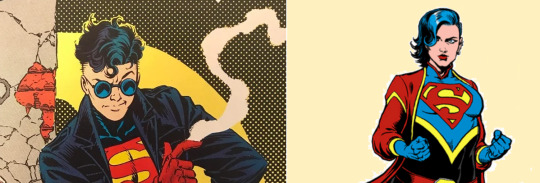
I notice that people online are very hot and cold about the Trans Superboy Pitch, they either love it or hate it and that doesn't leave a lot of room for nuance + discussion. So to be respectful to a fellow trans peer in the industry, I want to do a fair review/analysis of Skyrocket: the trans Conner Kent pitch by Magdalene Visaggio.
My general takeaway from the pitch is that I like the premise, but the details fumble the execution for me. I can really feel from reading the pitch that Visaggio cares about Superboy. She understands that he's a very weird legacy character who has struggled to find proper footing in the DC Universe after all these years. An effective legacy character is one who is able to spin off and expand upon the themes of the character whose mantle they carry. But the cheesy whatever-goes 90's-ness of Superboy's original run didn't give future writers a lot to work with in terms of a Superman Legacy Character.
It's why I genuinely believe the later retcon reveal that -part of Conner's DNA is from Lex Luthor- is a fantastic addition to his character. It takes a character who was just kind of screwing off to gentrify Hawaii back into the center of Superman's good vs evil conflict. But now Conner's problem is that his story is too tied to his origin and Superman's shadow. Placing Conner with the Kents in Smallville afterwards made him narratively redundant. What's next for him?
So let's dig into the pitch!
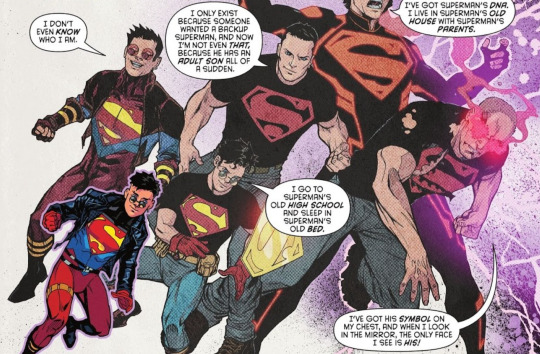
I like what's at the heart of this pitch. It's a very season-3-ATLA-Zuko "honor wasn't all it's cracked up to be" arc and I think that suits Conner's character really well! It's the details I have gripes with:
"Conner has been largely relegated to the Jason Todd of the Superfamily" oof, haha that's not a particularly fair characterization.
The constant comparing of Superman to Christian imagery. He's described as basically "Jesus goddamn Christ" in the pitch. The Tyrannical Kryptonians are named Saint, Shepherd and Savior. No surprise I don't like seeing a character who allegorically represented Jewish immigrants to be constantly compared to Christian imagery and deified.
It's inevitable with pitching to the company, but the pitch is bogged down by a lot of convoluted plot points. I get that it's necessary to pitch event tie-ins and universe hopping shenanigans, but it's a lot.
Leland feels like a plot device in this. I'm sure there were plans to flesh out the brotherly clone relationship between him and Conner so that he can feel like his own character, but from the summary he just kind of revolves around Conner the way the pitch describes Conner revolving around Superman. Oops!
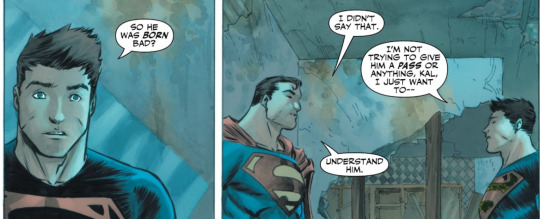
Conner's relation to Luthor and Superman works as a story about legacy, bloodlines and the things parents pass down to their kids. It's best when handled thematically and not literally because it's easy to get into essentialist "good genes" vs "evil genes" near-eugenics talking points. Unfortunately this pitch has a lot of that vibe. Leland has more Lex genes so he's super smart. Conner and Leland are able to start a schism in the Future Tyrannical Kryptonian House by "proving their truer genetic link to the original Superman, unsullied by thousands of years of tinkering" thereby gaining allies. Not great!
The part where Conner wants to find "his own Metropolis" by moving to Dripping Springs, Texas. That's Jinny Hex's field of operations, so is it really his own space? I would've just given Conner a new town so he can better stand on his own and build out a unique cast system.
Okay let's talk about the trans stuff!
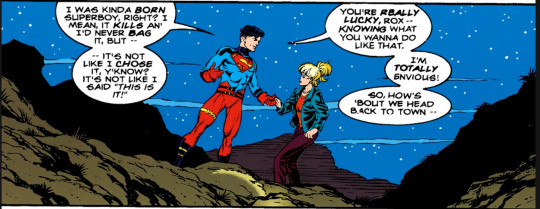
I get that it makes for an Iconic Visual Superhero Moment, but I really don't like the part where Conner steps through a magical crystal and pops out the other side as a trans woman. It robs her of having that discovery on her own. The pitch says "I believe that this is as natural a move as Iceman's coming out". And just?? Man, remember when Jean Grey read Iceman Bobby Drake's mind and robbed him of his agency by outing him through that invasion of privacy? For a pitch all about Conner's journey of defining herself, it weirdly robbed her of that moment.
The pitch does such a good job talking about how Conner feels like her whole life revolves around Superman and how pointless wanting to be Superman feels now that Jon Kent has taken the mantle. She has Clark's genes, goes to Clark's hometown school, is raised by Clark's parents and all that. So then why is she eventually named after the women in Clark's life? Constance "Connie" Lara Kent. Clark's Kryptonian mom and human grandma? Was the world so small that she could not name herself after anyone else or come up with a new name? Connie doesn't even get to name herself, her new name is one Martha Kent bestows her with. It's hypocritical, and doesn't have the same impact that Superman giving Superboy a Kryptonian name does.
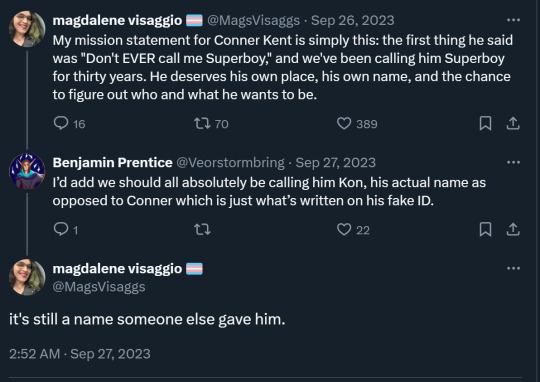
Speaking of which, this right here is my biggest gripe. It's not in the pitch itself but?? Wait- why go on about how Conner deserves a name that's not given to her and then turn around and make Martha name her? Sure, Connie comes up with the superhero name "Skyrocket" herself but surely she also deserves to name herself considering the thesis the pitch built up about self discovery and agency right?
Also with all due respect, this is the whitest queer take on Conner's identity. I wish white trans people could understand that you can have multiple true names that reflect different parts of you.
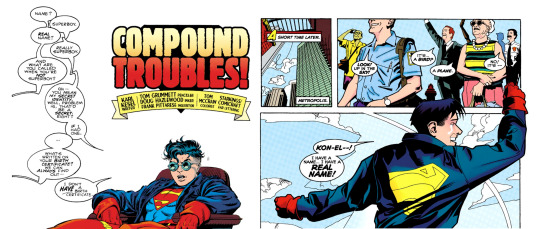
When Clark gives Superboy the name "Kon-El" it matters that it's given. It ties so well to the idea of familial acceptance into a nearly-extinct culture. You wouldn't know how to reclaim that part of your identity when that culture's been wiped out, so of course it's an honor to be trusted with a name that preserves Krypton's culture. This is a common practice with diaspora reclaiming cultural names from closed cultures, they are gifted their names by someone more culturally connected. I think the pitch having Martha name Connie is trying to echo this, but it doesn't hit the same without that cultural context. It also undercuts the genuine joy Conner felt from finally having a name he truly identifies with. Conner was only ever referred to as Superboy before then. When Clark gives him the name Kon El, Conner cries out that Kon El is his "real name". It's one of his defining moments, and to have that be diminished by saying "It's still a name someone else gave him" is so disappointing.
Then there's the design.
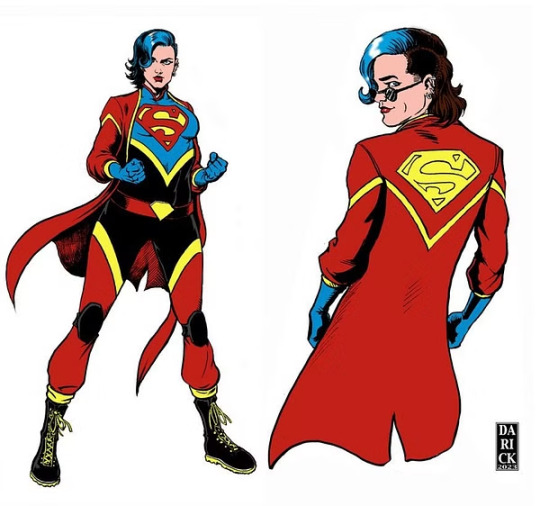
This is gonna lean more into preference, but I'm not the biggest fan of this design! I get what it's going for but it has too much going on everywhere. It also doesn't have that proto-punk look original Conner had, so it ends up not feeling like him. It's too superhero, and not enough casual-wear-on-a-supersuit that Conner sports really well. I see how it fits in with the everyone-in-Superfam-is-wearing-jackets-era, but I also think those new designs don't look good either. Especially Supergirl's. I feel like Conner should be more punk post transition. No respectability beam for her!
Also the name Skyrocket? It's giving knock off-brand toy vibes to me I'm sorry D: People on twidder suggested Supernova and that sounds way better! Even Visaggio stated she prefers that name so you can't be mad at me for this.
Overall big conclusion feelings!
I've been following Visaggio's work for a while because it's awesome seeing trans people getting picked up in comics. While there are some things about her writing I like, for the most part I've felt like her work isn't my cup of tea. I tried reading up a bunch of interviews she's in to try to understand why her writing wasn't clicking with me, and what I discovered is that we have fundamentally different approaches to queer storytelling.
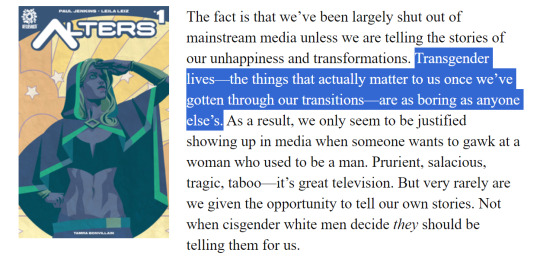
From Paste Magazine. I get where she's coming from, trans characters deserve to have multi-faceted narratives that don't overly center how they're othered at the expense of further characterization. But also? I just actually find the interior lives of queer people and identity interesting. I like writing the kind of escapism and joy that's informed by surviving and inheriting hardships rather than erasing those things or skipping past it. I think this is why Connie is robbed of her trans discovery in the pitch. Why we don't get to watch her grapple with gender identity in a political way. Queer stories about queer struggles are considered archaic and unnecessary nowadays. It's part of the escapism Visaggio values in her work; to give a place of respite for trans readers from the cruelty they experience in reality, but I don't connect to stories like that personally. Whenever I try to share queer Indonesian art and writing with my peers, I'm often told it's too painful to look at. That our pain doesn't fit the modern expectation for happy, empowering queer stories. "trans people get enough hardships in real life, they don't need that in their fiction" Visaggio still talks about her newest projects like this btw.
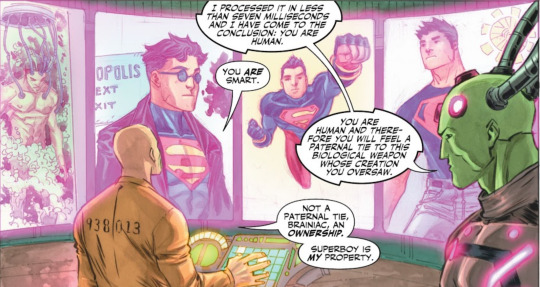
I'd love to see a take on Conner that more holistically continues the political immigrant themes of Superman. The white parts of fandom love interpreting Conner's identity crisis as primarily a queer struggle, but it's also one of a person grappling with his mixed heritage. He's a diaspora kid separated by a generation away from Krypton. He has yet to make peace with the Luthor side of his identity, one borne of generational trauma and resentment for one's roots. Instead of a take where his queerness separates him from the pressures of legacy, I want to see a Conner take that has themes that are intersectional about his mixed diaspora and queer identity. I want his superficial punk aesthetic to graduate into actual punk ideals. The anti-establishment and radical love philosophies of punk culture would make such a cool extension of Superman themes and it would make so much sense that someone facing so many intersections of marginalization would be radicalized from their experience. I want a queer Conner who isn't just empowering and idealistic, I want one that also gives space for queer readers to feel like their pain is seen too. Conner isn't "Truth, Justice and the American Way" he's famously "Truth, Justice, My Way".
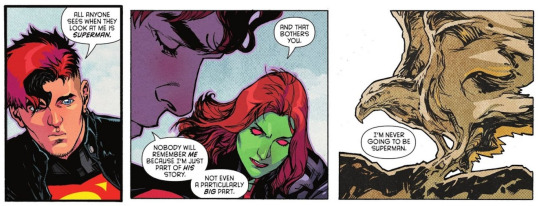
There's a tendency in media criticism to treat marginalized talent as infallible, and I don't think that fair to creatives like Visaggio. Being able to look at their ideas with nuance instead of essentializing it as being Good or Trash is the best way to respect diverse creativity. And my nuanced feelings are that a white queer person who looks at Conner's story and just sees the queer part and dismisses the diaspora mixed heritage side of him,,, is not going to give me the Conner story I want to see.
#askjesncin#superboy#kon el#conner kent#jesncin dc meta#media criticism#the thing about conner superboy is that his character is a mess#and I love a mess. I could talk about mess all day#this is a long way of saying that white queer people will never be able to give me the queer stories i need
245 notes
·
View notes
Text
But Germany’s performances of repentance have their limits. They do not extend, for example, to the genocide the German colonial army committed in Namibia against Herero and Nama people between 1904 and 1908, killing tens of thousands. Germany did not officially apologize for those bloody acts until 2021 and has not agreed to pay meaningful reparations to descendants of the victims. If the new German identity relies on isolating the Holocaust as a shameful aberration in national history and nullifying it via solemn remembrance, there is little room for the memory of colonial violence in the nation’s self-mythology. Genocide scholar Dirk Moses named this approach the “German catechism” in a 2021 essay that sparked heated debate. “The catechism implies a redemptive story in which the sacrifice of Jews in the Holocaust by Nazis is the premise for the Federal Republic’s legitimacy,” wrote Moses. “That is why the Holocaust is more than an important historical event. It is a sacred trauma that cannot be contaminated by profane ones—meaning non-Jewish victims and other genocides—that would vitiate its sacrificial function.”
Accordingly, Germany now sees its post-Holocaust mandate as encompassing not a broader commitment against racism and violence but a specific fealty to a certain Jewish political formation: the State of Israel. Germany has relied on its close diplomatic relationship to Israel to emphasize its repudiation of Nazism, but its connection to the Jewish state goes even further. In 2008, then-chancellor Angela Merkel addressed the Israeli Knesset to declare that ensuring Israel’s security was part of Germany’s “Staatsraison,” the state’s very reason for existence. If asked why it is worth preserving a German nationalism that produced Auschwitz, Germany now has a pleasing, historically symmetrical answer—it exists to support the Jewish state.
To that end, in recent years, Germany’s laudable apparatus for public cultural funding has been used as a tool for enacting a 2019 Bundestag resolution declaring that the Boycott, Divestment, and Sanctions (BDS) movement targeting Israel is antisemitic. Although the resolution is technically nonbinding, its passage has led to an unending stream of firings and event cancellations, and to the effective blacklisting of distinguished academics, cultural workers, artists, and journalists for offenses like inviting a renowned scholar of postcolonialism to speak, tweeting criticism of the Bundestag resolution, or having attended a Palestinian solidarity rally in one’s youth. A network of antisemitism commissioners—a system explored in this issue in a feature by Peter Kuras—has been deputized to monitor such offenses. These commissioners are typically white, Christian Germans, who speak in the name of the Jews and often playact Jewishness on a public stage, posing for photo ops in yarmulkes, performing Jewish music, wearing the uniform of the Israeli police, and issuing decrees on who is next in the pillory. When they tangle with left-wing Jews in Germany, canceling their events and attacking them as antisemites in the pages of various newspapers, they suggest what Germany’s antisemitism commissioner Felix Klein has said directly: That the Jews are not being sensitive enough to what antisemitism means to the Germans—that, in fact, these Jews do not understand antisemitism at all. In a perverse twist, the fact that the Germans were the most successful antisemites in history has here become a credential. By becoming the Jews’ consummate protectors, Germans have so thoroughly absorbed the moral lessons bestowed by Jewish martyrdom that they have no more need for the Jew except as symbol; by the logic of this strange supersessionism, Germans have become the new Jews. This is not only a matter of rhetorical authority on Jewish matters but is also often literal, as this self-reflexive philosemitism has led to a wave of German converts to Judaism. According to Tzuberi, “The Jewish revival is desired precisely because it is a German revival.”
If Jews are negated by this formulation, Palestinians are villainized by it. Last year, when the German state banned Nakba Day demonstrations, only days after the murder of Palestinian journalist Shireen Abu Akleh, police justified this suppression by claiming, in a familiar racist trope, that protesters would not have been able to contain their violent rage. Indeed, in Germany Palestinian identity itself has become a marker of antisemitism, scarcely to be spoken aloud—even as the country is home to the largest Palestinian community in Europe, with a population of around 100,000. “Whenever I would mention that I was Palestinian, my teachers were outraged and said that I should refer to [Palestinians] as Jordanian,” one Palestinian German woman speaking of her secondary school education told the reporter Hebh Jamal. Palestinianness as such has thus been stricken from German public life. In The Moral Triangle, a 2020 anthropological study of Palestinian and Israeli communities in Germany by Sa’ed Atshan and Katharina Galor, many Palestinians interviewed said that to speak of pain or trauma they’ve experienced due to Israeli policy is to destroy their own futures in Germany. “The Palestinian collective body is inscribed as ontologically antisemitic until proven otherwise. Palestinians, in this sense, are collateral damage of the intensifying German wish for purification from antisemitism,” wrote Tzuberi.
July 5, 2023
249 notes
·
View notes
Text
Do Republicans Care That Trump Admires Hitler?
The Atlantic's bombshell story this week was that Donald Trump expressed an admiration for Hitler, saying "I need the kind of generals Hitler had." This had been reported before, but the confirmation by former Trump Chief of Staff John Kelly gave an extra boost of confirmation from Trump's inner-most circle. How are Republicans responding to the news? In a variety of ways. Door #1, from the Trump campaign itself, is just to declare it all a lie: Trump’s campaign categorically denied The Atlantic’s reporting and blamed Harris for encouraging Trump’s assassination. Steven Cheung, a campaign spokesman, said Harris “continues to peddle outright lies and falsehoods that are easily disproven. The fact is that Kamala’s dangerous rhetoric is directly to blame for the multiple assassination attempts against President Trump and she continues to stoke the flames of violence all in the name of politics.” I actually respect this response the most, since it at least concedes the premise that Trump being pro-Hitler is a bad development that should be shunned. Not every Republican agrees. Behind Door #2 is New Hampshire Governor Chris Sununu, who said that Trump supporting Hitler is "baked-in to the vote at this point." In other words, Republicans already had figured Trump was a Hitler supporter and were fine with it. No surprises here. And then finally, there's Fox News' Brian Kilmeade, who's response was to say "actually, Trump was making a good point!" On Fox News, anchor Brian Kilmeade said Trump was justifiably frustrated by aides who refused to carry out orders they deemed illegal. Kilmeade said, “I can absolutely see him go, ‘It’d be great to have German generals that actually do what we ask them to do,’ maybe not fully being cognizant of the third rail of German generals who were Nazis or whatever.” "...or whatever," indeed. What sort of president wouldn't want generals who blindly follow executive orders to commit the most horrific atrocities humanity has ever witnessed? (Answer: the sort of president who isn't interested in replicating the most horrific atrocities humanity has ever witnessed). Meanwhile, yesterday on Bluesky I snarked that I couldn't wait for the inevitable "Jonathan Greenblatt response that contains three paragraphs of effusive praise for Trump’s allyship towards the Jewish community sandwiching a vague gesture that 'this sort of rhetoric isn’t helpful.'" That drew off of this post which observed how Greenblatt's recent treatment of Trump has been defined by a fundamental trust in Trump as a true "ally of the Jews," the commitment to which he regrettably occasionally falls short of realizing. So was my prediction on Greenblatt's response correct? Answer: We don't know, because as far as I can tell the ADL hasn't issued a statement on this news at all! What a sterling performance by America's preeminent antisemitism watchdog. via The Debate Link https://ift.tt/p7WQjYc
46 notes
·
View notes
Text
As part of the 80's OVA binge, partner and I watched Dream Hunter Rem, a story of a paranormal girl detective who fights demons in people's dreams. A typical premise, but the opening shots of her office had this, uh, interesting detail?

...Is Rem Jewish? I don't think so, that is never mentioned. I feel like this is a typical "mysticism potpourri" thing, where throwing in any western religious symbols works for a vibe in Japan because they don't care, and the existence of things like kaballah made jewish symbols work extra well (though it otherwise isn't that kind of work beyond a character who is a buddhist monk using buddhist symbols organically). I lack the skills to tell what the text says - I don't think it tracks as Hebrew, but it might be a weird font, some other language, or just nonsense scribbles. Likely they found some poster somewhere and copied it as a form of reference - I am curious what that could be!
(Googling this in Japanese does not bring up any clarifying discussion, alas)
71 notes
·
View notes
Text
Do you know this Jewish character?

#jumblr#jewish characters#falsettos#marvin falsettos#jewish story premise#when I say falsettos I’m including the musicals that were combined to make falsettos too#I can’t believe I haven’t posted him before
115 notes
·
View notes
Text
Naomi Klein's "Doppelganger"
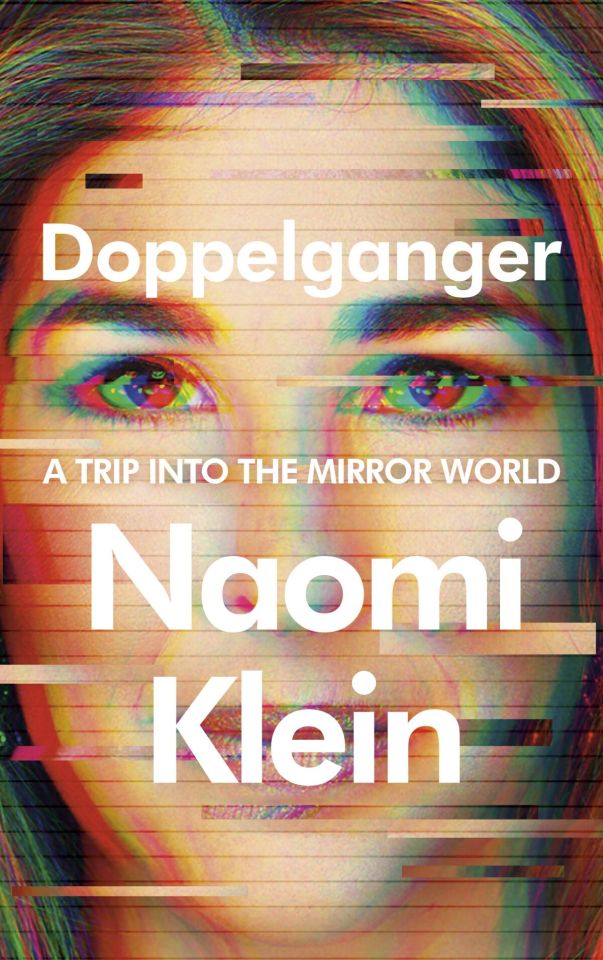
Tomorrow (September 6) at 7pm, I'll be hosting Naomi Klein at the LA Public Library for the launch of Doppelganger.
On September 12 at 7pm, I'll be at Toronto's Another Story Bookshop with my new book The Internet Con: How to Seize the Means of Computation.

If the Naomi be Klein you’re doing just fine If the Naomi be Wolf Oh, buddy. Ooooof.
I learned this rhyme in Doppelganger, Naomi Klein's indescribable semi-memoir that is (more or less) about the way that people confuse her with Naomi Wolf, and how that fact has taken on a new urgency as Wolf descended into conspiratorial politics, becoming a far-right darling and frequent Steve Bannon guest:
https://us.macmillan.com/books/9780374610326/doppelganger
This is a very odd book. It is also a very, very good book. The premise – exploring the two Naomis' divergence – is a surprisingly sturdy scaffold for an ambitious, wide-ranging exploration of this very frightening moment of polycrisis and systemic failure:
https://www.youtube.com/watch?v=lCjcwVhFhTA
Wolf once had a cluster of superficial political and personal similarities to Klein: a feminist author of real literary ability, a Jewish woman, and, of course, a Naomi. Klein grew accustomed to being mistaken for Wolf, but never fully comfortable. Wolf's politics were always more Sheryl Sandberg than bell hooks (or Emma Goldman). While Klein talked about capitalism and class and solidarity, Wolf wanted to "empower" individual women to thrive in a market system that would always produce millions of losers for every winner.
Fundamentally: Klein is a leftist, Wolf was a liberal. The classic leftist distinction goes: leftists want to abolish a system where 150 white men run the world; liberals want to replace half of those 150 with women, queers and people of color.
The past forty years have seen the rise and rise of a right wing politics that started out extreme (think of Reagan and Thatcher's support for Pinochet's death-squads) and only got worse. Liberals and leftists forged an uneasy alliance, with liberals in the lead (literally, in Canada, where today, Justin Trudeau's Liberal Party governs in partnership with the nominally left NDP).
But whenever real leftist transformation was possible, liberals threw in with conservatives: think of the smearing and defenestration of Corbyn by Labour's right, or of the LibDems coalition with David Cameron's Tories, or of the Democrats' dirty tricks to keep Bernie from appearing on the national ballot.
Lacking any kind of transformational agenda, the liberal answer to capitalism's problems always comes down to minor tweaks ("making sure half of our rulers are women, queers and people of color") rather than meaningful, structural shifts. This leaves liberals in the increasingly absurd position of defending the indefensible: insisting that the FDA shouldn't be questioned despite its ghastly failures during the opioid epidemic; claiming that the voting machine companies whose defective products have been the source of increasingly urgent technical criticism are without flaw; embracing the "intelligence community" as the guardians of the best version of America; cheerleading for deindustrialization while telling the workers it harmed with "learn to code"; demanding more intervention in speech by our monopolistic tech companies; and so on.
It's not like leftists ever stopped talking about the importance of transformation and not just reform. But as the junior partners in the progressive coalition, leftists have been drowned out by liberal reformers. In most of the world, if you are worried about falling wages, corporate capture of government, and scientific failures due to weak regulators, the "progressive" answer was to tell you it was all in your head, that you were an unhinged conspiratorialist:
https://doctorow.medium.com/the-swivel-eyed-loons-have-a-point-3434d7cbfae2
For Klein, it's this failure that the faux-populist right has exploited, redirecting legitimate anger and fear into racist, xenophobic, homophobic, sexist and transphobic rage. The deep-pocketed backers of the conservative movement didn't just find a method to get turkeys to vote for Christmas – progressives created the conditions that made that method possible.
If progressives answer pregnant peoples' concerns about vaccine risks – concerns rooted in the absolute failure of prenatal care – with dismissals, while conservatives accept those concerns and funnel them into conspiratorialism, then progressives' message becomes, "We are the movement of keeping things as they are," while conservatives become the movement of "things have to change." Think here of the 2016 liberal slogan, "America was already great," as an answer to the faux-populist rallying cry, "Make America great again."
When liberals get to define what it means to be "progressive," the fundamental, systemic critique is swept away. Conservatives – conservatives! – get to claim the revolutionary mantle, to insist that they alone are interested in root-and-branch transformation of society.
Like the two Naomis, conservatives and progressives become warped mirrors of one another. The progressive campaign for bodily autonomy is co-opted to be the foundation of the anti-vax movement. This is the mirror world, where concerns about real children – in border detention, or living in poverty in America – are reflected back as warped fever-swamp hallucinations about kids in imaginary pizza restaurant basements and Hollywood blood sacrifice rituals. The mirror world replaces RBG with Amy Coney-Barrett and calls it a victory for women. The mirror world defends workers by stoking xenophobic fears about immigrants.
But progressives let it happen. Progressives cede anti-surveillance to conservatives, defending reverse warrants when they're used to enumerate Jan 6 insurrectionists (nevermind that these warrants are mostly used to round up BLM demonstrators). Progressives cede suspicion of large corporations to conservatives, defending giant, exploitative, monopolistic corporations so long as they arouse conservative ire with some performative DEI key-jingling. Progressives defend the CIA and FBI when they're wrongfooting Trump, and voting machine vendors when they're turned into props for the Big Lie.
These issues are transformed in the mirror world: from grave concerns about real things, into unhinged conspiracies about imaginary things. Urgent environmental concerns are turned into a pretense to ban offshore wind turbines ("to protect the birds"). Worry about gender equality is transformed into seminars about women's representation in US drone-killing squads.
For Klein, the transformation of Wolf from liberal icon – Democratic Party consultant and Lean-In-type feminist icon – to rifle-toting Trumpling with a regular spot on the Steve Bannon Power Hour is an entrypoint to understanding the mirror world. How did so many hippie-granola yoga types turn into vicious eugenicists whose answer to "wear a mask to protect the immunocompromised" is "they should die"?
The PastelQ phenomenon – the holistic medicine and "clean eating" to QAnon pipeline – recalls the Nazi obsession with physical fitness, outdoor activities and "natural" living. The neoliberal transformation of health from a collective endeavor – dependent on environmental regulation, sanitation, and public medicine – into a private one, built entirely on "personal choices," leads inexorably to eugenics.
Once you start looking for the mirror world, you see it everywhere. AI chatbots are mirrors of experts, only instead of giving you informed opinions, they plagiarize sentence-fragments into statistically plausible paragraphs. Brands are the mirror-world version of quality, a symbol that isn't a mark of reliability, but a mark of a mark, a sign pointing at nothing. Your own brand – something we're increasingly expected to have – is the mirror world image of you.
The mirror world's overwhelming motif is "I know you are, but what am I?" As in, "Oh, you're a socialist? Well, you know that 'Nazi' stands for 'National Socialist, right?" (and inevitably, this comes from someone who obsesses over the 'Great Replacement' and considers themself a 'race realist').
This isn't serious politics, but it is seriously important. "Antisemitism is the socialism of fools," its obsession with "international bankers" the mirror-world version of the real and present danger from big finance and private equity wreckers. And, as Klein discusses with great nuance and power, the antisemitism discussion is eroded from both sides: both by antisemites, and by doctrinaire Zionists who insist that any criticism of Israel is always and ever antisemetic.
As a Jew in solidarity with Palestinians, I found this section of the book especially good – thoughtful and vigorous, pulling no punches and still capturing the discomfort aroused by this deliberately poisoned debate.
This thoughtful, vigorous prose and argumentation deserves its own special callout here: Klein has produced a first-rate literary work just as much as this is a superb philosophical and political tome. In this moment where the mirror world is exploding and the real world is contracting, this is an essential read.
I'll be Klein's interlocutor tomorrow night (Sept 6) at the LA launch for Doppelganger. We'll be appearing at 7PM at the @LAPublicLibrary:
https://lafl.org/ALOUD
Livestreaming at:
https://youtube.com/live/jIoAh-jxb2k

If you'd like an essay-formatted version of this post to read or share, here's a link to it on pluralistic.net, my surveillance-free, ad-free, tracker-free blog:
https://pluralistic.net/2023/09/05/not-that-naomi/#if-the-naomi-be-klein-youre-doing-just-fine

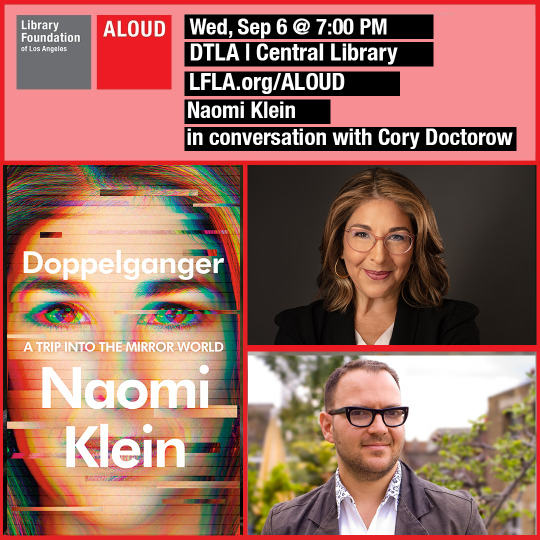
#naomi klein#naomi wolf#conspiratorialism#climate#shock doctrine#race#antisemitism#gender#feminism#books#reviews#no logo#corporatism#heel turns#realignment#power#leftism vs liberalism#gift guide#rabbit holes#memoir#israel#zionism#pluralistic
273 notes
·
View notes
Text
9 TBRs for 2025









I was delighted to get tagged by the fabulous @burberrycanary! Thank you. <3
The Woman Upstairs by Claire Messud
The desire to read Messud's novel about an elementary schoolteacher who seems nice and calm on the outside but is secretly seething with anger and frustration on the inside was sparked by this post and a subsequent conversation with @village-skeptic about unlikeable female protagonists. I've been dying to read this for a while now, but it was surprisingly difficult to find in physical form (I'm sick of looking at screens all day and my library only had the ebook). Package tracking tells me it's finally due to arrive on January 10. I'm genuinely so very excited to read this!
Our Evenings by Alan Hollinghurst
This novel, which traces the life of a gay, biracial actor in England from the 1960s to the pandemic is only one example of a whole number of books* on my TBR about queer middle-aged men looking back on their lives and in the process delving into themes of personal growth, identity, and cultural and societal change. Wonder what that says about me as I approach middle age ever more rapidly myself? One can only speculate, of course...
*see also: Four Squares by Bobby Finger; My Ex-Life by Stephen McCauley; Caledonian Road by Andrew O'Hagan
Madhouse at the End of the Earth: The Belgica's Journey into the Dark Antarctic Night by Julian Sancton
Not much to say about this except that my thirst for books about doomed (Ant)arctic expeditions has apparently still not been quenched. I guess this is my version of True Crime. This has made several Best-of lists, so I hope that it'll be well-written (and edited!) too, which is not always a given with nonfiction books.
The Winter Soldier by Daniel Mason
The assumption is an obvious one to make, but no, this has nothing to do with the #1 Blorbo of my heart. This is actually a novel about a young medical student from Vienna thrown into a remote WWI field hospital, where he soon leaves behind any romantic notions about glory and heroism as he faces the brutal reality of war. I've read the first 50 pages of this a while ago, and I'm really eager to get back to it.
Effingers by Gabriele Tergit
This 1951 novel is often described as the "Jewish Buddenbrooks"—a comparison that I understand for marketing purposes but that I nevertheless do not like for a whole host of reasons. It’s an epic, multigenerational story about a German-Jewish family from the late 19th century through WWII. I got a beautiful special hardcover edition of this for Christmas and I can't wait to savor all 904 pages of it.
Secret City: The Hidden History of Gay Washington by James Kirchick
Speaking of long books. I bought this 848-page brick of a political and social history of queer (not exclusively gay as the misleading title would suggest) Washington at the height of my Fellow Travelers obsession... and then I just never got around to reading it. A failure that I really want to make up for this year.
Daddy by Emma Cline
I already very much liked but did not unreservedly love Emma Cline's debut The Girls. However, I was completely blown away by her follow-up novel The Guest, which she published last year, and which instantly catapulted her to auto-buy status for me. So, it's only natural that I would want to read the only book of hers that I haven't read yet. Daddy is a short story collection, which will hopefully deliver the same sharp observations, wonderfully complex characters, and elegant & precise prose that I have adored so much in her novels.
The Warm Hands of Ghosts by Katherine Arden
To be honest, the premise of this—historical fiction with supernatural elements, following a combat nurse during WWI searching for her missing brother—does not super excite me (anything magical realism-adjacent has traditionally not been a great success for me) and reviews seem to be pretty mixed. But. Katherine Arden is the author of my beloved Winternight Trilogy*, so I will at least give this a fair chance.
*seriously I want to grab all the Romantasy girlies and shove this into their hands instead of whatever latest abomination Cassandra Clare or Sarah J. Maas have cooked up. ...uh, sorry if you're a fan? 😬
Manhattan Beach by Jennifer Egan
I read and enjoyed Jennifer Egan's Pulitzer Prize-winning novel A Visit from the Goon Squad many years ago and have been meaning to read another book by her ever since. When a couple of my family members asked what I wanted for Christmas and I put together a little list for them (cause that's what I do), I stumbled upon Manhattan Beach. It's a blend of historical fiction, mystery, and family drama set in Depression-era New York City, about a young woman who pioneers as the first professional female diver at the Brooklyn Navy Yard. Does that not sound like the perfect book for me? Seriously, the summary reads like I made it up in fever dream!
--
Looking back over this list, I'm somewhat surprised to realize that it gives the impression that I'm much more of a historical fiction reader than I actually am. Or thought myself to be, I guess. Huh! How about that.
Ok tagging: @ethicalhorseslaughter, @burninblood, @thisonesatellite, @between-a-ship-and-a-hard-place, @voylitscope, @aimmyarrowshigh, @weenhand, @painted-doe, @buckrogers, @maplefiasco and everyone else who wants to do this! Show me your books, please.
(I know this has been making the rounds, so apologies if I double- or triple-tagged anyone.)
33 notes
·
View notes
Note
🏳️🌈
omg yes please
(Drop a 🏳️🌈 in my inbox and I’ll respond with a queer media recommendation!)
This recommendation is for something I keep thinking is more well-known than it is--the graphic novel series DeadEndia by Hamish Steele, which was adapted into the Netflix series Dead End: Paranormal Park!
The basic premise of both is that the main character, Barney, a gay Jewish teenage trans boy, gets a job at a theme park housing a magic elevator that can travel between the 13 planes of reality. There are angels, demons, magic, and a phenomenal cast of diverse characters that fill my heart with so much joy.
I got to the show first, not long after season one released. The show was cancelled after season two as part of Netflix's war against queer television, so after watching the show, I knew I needed to check out the source material.
There are differences between the two, but Hamish Steele was the showrunner, so the spirit is the same. I love them both and I think it's a goddamn tragedy that we were robbed of further seasons of the show. The third graphic novel released after the cancellation, and was dedicated to "everyone who has ever had their favorite TV show cancelled." I don't know what exactly the crew had planned for season 3--because Hamish Steele said on Twitter that they were already working on it iirc--but the third book concludes the story beautifully. If you got into the show and wanted to know what was coming next, do yourself a favor and read the comics.

Here's the plot summary for Book 1 - The Watcher's Test:
Barney Guttman’s life has been turned upside down. His family is struggling to fully embrace his trans identity, but thanks to his best friend Norma, he’s just landed a job at Phoenix Parks, a Dollywood-esque amusement park inspired by the long life and career of mysteriously youthful actress and singer Pauline Phoenix. Soon, Barney and his dog, Pugsley, secretly move into the haunted house attraction. Little does Barney know, the house contains a portal to the demonic planes of Hell. When Courtney, Barney’s devilish new roommate, invites a demon king to Earth through the portal, they offer Barney and Norma as flesh vessels for the king, but in a strange twist, Pugsley is possessed instead! It’s a race through the park to save Pugsley—and the world—from the demon king’s reign of terror that leaves Pugsley with strange and magical side effects. With all of this chaos going on, Barney is also discovering he has crush on park employee, Logan, so he must face his biggest fear of all… talking to someone he likes.
And here's the trailer for the first season of the Netflix show:
youtube
I absolutely adore this story in both its forms, and I think more people should check it out. It makes me happy, and I find it hugely inspiring. It makes me want to go work on my own art, which is pretty much the highest praise I can give a piece of fiction.
Ask For a Rec | Other Media Recommendations | Support Links
#deadendia#dead end paranormal park#dead end: paranormal park#hamish steele#ren's media recs#original post#id in alt text#uncaptioned video
37 notes
·
View notes
Text
Anticipated New Releases of 2024
**As anticipated by Me. Mostly SFF. Links are to goodreads because that's what I use, sorry. Anything marked "new to me" I haven't read anything by that author before and therefore can't vouch for the quality. I just think the premise is neat.**
Emily Wilde's Map of the Otherlands, Heather Fawcett (16 January)
Sequel to the charming novel about the fairy anthropologist.
Exordia, Seth Dickinson (23 January)
Well, it isn't a new Baru Cormorant, but this modern SF about first contact may be the next best thing.
City of Stardust, Georgia Summers (30 January)
New to me. A young woman descends into the underworld in order to break her family's fatal curse.
The Tainted Cup, Robert Jackson Bennett (6 February)
New to me. A sherlock holmes flavored duo solves the mystery of the murder of an imperial official in a labyrinthine fantasy realm.
What Feasts at Night, T Kingfisher (13 February)
The sequel to the mushroom horror book What Moves the Dead.
The Warm Hands of Ghosts, Katherine Arden (13 February)
A ghost story set in WW1 about a woman searching for her missing brother.
The Fox Wife, Yangsze Choo (13 February)
New to me. A detective in 1908 Manchuria investigates a young woman's death in an area full of mythical foxes.
Redsight, Meredith Mooring (27 February)
New to me. Unpowered priestess and Imperial pawn is set on a collision path with a pirate with a grudge for the Imperium (Gay romance).
Sunbringer, Hannah Kaner (12 March)
Sequel about the professional godkiller Kissen.
Jumpnauts, Hao Jingfang (12 March)
New to me. A SF novel in translation from Chinese, with three scientists joining forces to deal peacefully with a first contact situation.
The Woods All Black, Lee Mandelo (19 March)
I liked Mandelo's debut novel very much so I'm excited to read this queer horror novella set in 1920s Appalachia.
Floating Hotel, Grace Curtis (19 March)
New to me. A series of cozy character vignettes on a space cruise ship after a murder has occurred. One of the four (!) space hotel murder crimes books coming out this year.
The Emperor and the Endless Palace, Justinian Huang (26 March)
New to me. Reincarnation gay romance set in 4 BCE China, the 1740s, and modern-day LA.
Alien Clay, Adrian Tchaikovsky (28 March)
Far future space xenoarchaeology by a man trapped on a prison planet.
Someone You Can Build a Nest In, John Wiswell (2 April)
New to me. Bizarre lesbian cannibalism monster romance from the point of view of the monster.
The Familiar, Leigh Bardugo (9 April)
Glad to see Bardugo writing more adult fantasy, and this one is especially exciting because it's a fantasy set in early modern Spain with a Jewish main character. Fun to see a more original historical period.
A Sweet Sting of Salt, Rose Sutherland (9 April)
New to me. Lesbian selkie romance.
Death in the Spires, KJ Charles (11 April)
Charles branching out from romance into historical Oxford murder mystery about a group of friends with dark secrets.
Audrey Lane Stirs The Pot, Alexis Hall (22 April)
The new Hall thinly veiled british baking show romcom. Libby says it's releasing in April but I've heard nothing from the author so I think it may be Alecto'd (shifted to next year)
Necrobane, Daniel M Ford (23 April)
Sequel to the dungeons and dragons-esque low fantasy lesbian necromancy book.
A Letter to the Luminous Deep, Sylvie Cathrall (25 April)
New to me. Sweet underwater epistolary academic romance.
How To Become the Dark Lord and Die Trying, Django Wexler (21 May)
New to me. A young hero caught in a fantasy time loop gives up and tries being the villain in an attempt to escape.
Goddess of the River, Vaishnavi Patel (21 May)
Another woman-centered retelling of Hindu mythology, this time based on the river goddess Ganga.
Escape Velocity, Victor Manibo (21 May)
New to me. Evil and toxic private school alumni jockey for position in a space hotel event in an attempt to escape a dying Earth.
The Fireborne Blade, Charlotte Bond (28 May)
New to me. Gay dragon slaying knight novella.
Evocation, ST Gibson (28 May)
New to me but looks very cool. Attorney and medium David attempts to escape his deal with the devil with the help of his ex boyfriend and his ex boyfriend's wife (Poly romance).
Service Model, Adrian Tchaikovsky (4 June)
In an SF future, a robot kills its human owners and ventures out into a world where human supremacy is beginning to crumble.
Lady Eve's Last Con, Rebecca Fraimow (4 June)
New to me. A con artist seeks revenge on the man who hurt her sister, who's coincidentally also on a space cruise ship (Sapphic romance subplot).
Triple Sec, TJ Alexander (4 June)
An actual mainstream published poly romance (!!) by trans author Alexander.
Running Close to the Wind, Alexandra Rowland (11 June)
Gay! Pirates! Scheming! Alt fantasy world! Monks! I liked Taste of Gold and Iron a lot and I'm very excited for this one.
The Knife and the Serpent, Tim Pratt (11 June)
New to me. Space opera about an interdimensional organization. Also, there's a sentient starship.
The Witchstone, Henry Neff (18 June)
A childhood favorite of mine's adult debut, featuring a demon who suddenly has to shape up at his curse keeper job after eight hundred years of slacking.
Rakesfall, Vajra Chandrasekera (18 June)
VERY excited to read more weird queer sff from this author after a fantastic debut. Looks weird. I'm in.
Foul Days, Genoveva Dimova (25 June)
New to me. A witch in a Slavic fantasy inspired world flees her evil ex, the Tsar of Monsters. There's also a plague and a detective.
Saints of Storm and Sorrow, Gabriella Buba (25 June)
New to me. Filipino inspired anticolonialist fantasy novel about a nun who is secretly practicing the religion of her goddess.
The Duke at Hazard, KJ Charles (18 July)
A queer regency with an incognito duke by one of my particular favorite romance authors.
Long Live Evil, Sarah Rees Brennan (30 July)
!!! Very excited to see a new adult fantasy by Brennan. A reader is dragged into a fictional world and finds herself the villain.
A Sorceress Comes to Call, T Kingfisher (20 August)
A retelling of The Goose Girl from reliably good fairy tale stalwart Kingfisher.
Buried Deep and Other Stories, Naomi Novik (17 September)
Collection of Novik's short stories.
Swordcrossed, Freya Marske (8 October)
VERY excited to see a new book by talented writer Marske. A man falls in love with the duelist hired for his arranged wedding. MEANWHILE. details of the fantasy world wool industry.
Feast While You Can, Mikaella Clements and Onjuli Datta (29 October)
New to me. Small town queer cave horror.
The Last Hour Between Worlds, Melissa Caruso (19 November)
Multiple reality murder mystery spy vs spy type antics, with lesbians.
#book recommendations#on the tbr#now I would Like to put alecto the ninth on this but as we know. NO news (sobs)#long post#updated 3/8 with more books I've added since I posted this
126 notes
·
View notes